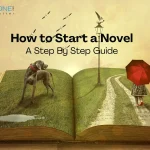Introduction
Embarking on the journey of book writing a book can be both exhilarating and daunting for beginners. Whether your goal is to write a non-fiction piece, memoir, or novel, navigating the complexities of the writing process takes commitment and careful planning. We’ll look at ten crucial pointers in this post to help aspiring authors succeed in the literary world.
Find Your Writing Space
uncovering your perfect writing place is like uncovering a treasure trove when it comes to book writing. Your creativity and productivity can be significantly impacted by your surroundings. Start by experimenting with different environments, such as a quiet park bench, a busy café, or a quaint spot at home.
Try out various atmospheric conditions until you discover one that piques your interest. Always keep in mind that your working area should be a haven designed to suit your needs, devoid of outside distractions, and brimming with ideas. You provide the groundwork for the success of your writing endeavors by defining this holy area.
You may also like: Marketing Strategies for Self Published Novels | Get Noticed
Set Achievable Goals
Setting attainable goals serves as the compass that leads all prospective writers through the huge sea of invention in the exciting voyage that is book writing. When you set out on your literary journey, don’t forget to divide your overall objective of finishing a book into achievable milestones.
Each step you take towards realizing your goal of being a published author, whether it’s planning out chapters, creating daily word counts, or dedicating specific writing periods, will help you get there. Setting attainable goals helps you stay on track and celebrate your accomplishments, which will rekindle your enthusiasm and dedication to finishing your book.
Develop Your Characters
When it comes to writing books, creating characters that people will want to read about is crucial. Every character should be carefully developed, with depth, weaknesses, and goals that your audience can relate to. Describe their goals, history, and character attributes first in order to develop multifaceted characters that readers can relate to on an emotional level.
As the story progresses, demonstrate their development by letting them overcome obstacles and change naturally. Keep in mind that your book’s characters are its heart and soul since they propel the plot forward. By investing effort in their development, you may create a story that draws readers in and holds their attention throughout.
Outline Your Plot
Writing a successful novel starts with developing an engaging plot. Plot out your story in detail before you start writing your novel. This story map will help you navigate the turns and turns of your story, maintaining continuity and drawing readers in from beginning to end.
Start by jotting down important story points and character arcs, and then arrange them into a well-organized framework. In addition to streamlining your writing process, this blueprint gives you direction and focus as you write your book. Make an investment in this fundamental stage, and observe how your story takes on a clear, purposeful development.
You may also like: 5 Key Steps to Successfully Self Publishing Your Novel
Write Regularly
Writing consistently is a fundamentally important component of book writing success. Maintaining consistency is crucial while starting the process of writing a book. Aspiring writers can overcome writer’s block and procrastination by committing to writing on a regular basis and creating a routine for themselves.
Frequent writing sessions help someone develop discipline and gradually improve their craft. Making meaningful progress on your book-writing journey requires you to maintain a consistent writing habit, whether that means setting weekly writing objectives or allocating a specified period each day.
Seek Feedback
Getting feedback is a vital tool that helps new writers navigate the complex world of book writing and find their way through the dense prose. As a beacon, constructive criticism highlights blind spots and improves story arcs. Accept criticism as an essential tool that will help you turn unpolished drafts into polished works of art.
Every viewpoint—whether from mentors, beta readers, or writing groups—adds a level of understanding that is essential for development. Take criticisms positively and use them as a springboard for writing greatness. In the world of book writing, criticism is not only helpful—it is indispensable.
Revise and Edit
It is impossible to overestimate the significance of editing and revising when producing a book. This is the part of the manuscript where it starts to really shine. Through revision, you may polish your concepts, write more concisely, and make sure your story makes sense from beginning to end.
The goal of editing, on the other hand, is to make your writing look better, correct mistakes, and enhance your punctuation and grammar. These actions taken collectively transform your work from an unpolished draft into a polished masterpiece. Therefore, embrace the editing and revision process—this is the magical part of your journey as a beginning book writer.
Stay Inspired
Remaining creatively motivated is the compass that directs each word, page, and chapter on the exciting trip that is book writing. The creative fire within a writer is stoked by inspiration, which propels them forward even when the road ahead appears difficult.
Nurturing inspiration is crucial, whether it takes the form of taking in the beauty of nature, immersing oneself in engrossing stories, or interacting with other writers. Aspiring writers can foster an environment that is conducive to the growth of their book writing careers by embracing curiosity, partaking in a variety of experiences, and adhering to a strict writing schedule.
In the colorful tapestry of storytelling, continuing to be inspired is not only a luxury but also a necessity for any newcomer setting out on their literary journey.
You may also like: 10 Effective Strategies to Improve Your Reading Habits
Honor Your Advancement
When it comes to book writing, you have to respect your progress and see each step as a victory. Recognising your progress as a novice in the huge world of storytelling keeps you motivated and forward motion.
Every writing achievement, whether it’s finishing a chapter, honing your story, or learning a new skill, should be celebrated. Accept the process of personal development, realizing that every word you write advances your writing career.
You get a sense of accomplishment that drives you to finish your literary masterpiece by acknowledging your progress.
Conclusion
Starting a starting book writing career is an exciting journey full of opportunities and obstacles. Aspiring writers can confidently and creatively handle the intricacies of the writing process by adhering to these ten crucial pointers.
Never forget that the world is waiting for you to share your tale, so grab a pen, let your creativity run wild, and make your voice heard.
You may also like: 100+ Adjectives That Start with C (With Definitions & Examples)
Frequently Asked Questions
The time it takes to write a book varies greatly depending on factors such as the genre, complexity of the story, and individual writing speed. Some writers may complete a manuscript in a few months, while others may take years to finish.
Writer’s block is a common challenge for writers at all levels. To overcome it, try changing your writing environment, taking a break to recharge, or experimenting with different writing prompts. Sometimes, simply pushing through and writing, even if it’s imperfect, can help break the creative logjam.
While some writers prefer to write without a detailed outline, having a basic plot structure can provide direction and coherence to your story. However, the outlining process is subjective, and writers should choose the approach that works best for them.
Sharing your work with trusted peers or writing groups can provide valuable feedback and encouragement. However, it’s essential to choose your audience wisely and be open to constructive criticism. Ultimately, the decision to share your work is personal and depends on your comfort level.
Once you’ve finished writing your book, the next steps may include revising, editing, and seeking publication. Consider hiring a professional editor to polish your manuscript, research publishing options, and explore avenues for marketing and promotion.
















